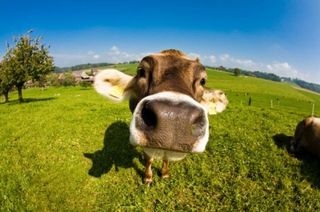Friends
The Psychology Behind Our Meal Plans: Why We Eat Whom We Eat
A new video by Dr. Melanie Joy about carnism is extremely well done
Posted December 30, 2015
Meal plan psychology 101: Why we choose to eat whom we eat
As we move ahead into 2016, there's yet more good news for nonhuman animals (animals) in the form of an excellent discussion about our meal plans. Every now and again a video/documentary comes along that really changes hearts and minds. Blackfish, an award winning exposé of the abuse of animals at SeaWorld, surely is one, and I believe a new video by Dr. Melanie Joy called The Secret Reason We Eat Meat has the potential to be extremely influential in motivating people to seriously consider changing their meal plans.
The meat paradox: Carnism exposed
Many people know about the incredibly horrific treatment to which "food animals" are subjected, but still choose to eat these formerly sentient beings. I've heard people say, "I know they suffer but I love my burger." This is the meat paradox. People who choose to eat cows and pigs, for example, are incredibly offended when they hear about people eating dogs or cats. However, cows and pigs are no less sentient and don't suffer less than dogs or cats. I previously wrote about this in an essay called Is Eating Dogs Different from Eating Cows and Pigs?, noting that we must be consistent with our choices about who winds up in our mouth (please also see Babe, Lettuce, and Tomato: Dead Pig Walking). It's all too easy to deny the enormous amounts of pain, suffering, and death that "food animals" endure from birth to being horrifically slaughtered on killing floors, brutality that is hidden from our senses.
"Have you ever wondered why you haven't wondered?"
Carnism is a term coined by Dr. Joy and refers to "the ideology that supports the use of animals for food, clothing or other consumer products." Furthermore, "Central to the ideology, according to this view, is the acceptance of meat-eating as 'natural, normal, necessary, and nice' An important feature of carnism is the classification of only particular species of animal as food, and the acceptance of practices toward those animals that would be rejected as unacceptable cruelty if applied to other species." In her video Dr. Joy talks about how and why people are inconsistent in how they view other animals and begins with the question, "Have you ever wondered why you might eat chicken's wings but not swan's wings, beef burgers but not mouse burgers ... and have you ever wondered why you haven't wondered?"
Let me say a few more words about Dr. Joy's presentation, as it's readily available, short (18 minutes), to the point, extremely well organized with very useful visuals, and really made me think deeply about how institutionalized and subtle are widespread messages about whom -- not what -- we eat. The Secret Reason We Eat Meat is not "radical" as some might think, nor is it prescriptive. Rather, Dr. Joy carefully analyzes how our meat-eating tendencies -- what she calls carnistic biases -- are deeply embedded into society and how extremely subtle and invisible messages cause us to engage in irrational practices that we would otherwise find offensive. She rightly notes we must replace apathy with empathy. The comments that are offered do go all over the place and most are very thoughtful. One of my friends wrote to me, "Whoa. that was potent" and another wrote, "Great! Wonderful ‘partner’ to ‘cowspiracy’. Thank you."

A rapidly increasing database is showing just how deeply emotional "food animals" truly are. I chose the teaser image of a cow's lovely nose, also presented here, because we can learn a lot about the emotional state of cows from their nose and ears (please see The Cow's Nose Shows How They're Feeling About Life and The Emotional Lives of Cows: Ears Tell Us They're Feeling OK). "Food animals," similar to the animals with whom we choose to share our homes, are sentient beings who deeply care about what happens to them, their families, and their friends. We must honor these facts, stemming from detailed scientific research, when we interact with them.
My humble suggestion is to watch The Secret Reason We Eat Meat, watch it again, share it widely, and deeply consider who winds up in your mouth. It really is that good.
Marc Bekoff's latest books are Jasper's Story: Saving Moon Bears (with Jill Robinson), Ignoring Nature No More: The Case for Compassionate Conservation, Why Dogs Hump and Bees Get Depressed: The Fascinating Science of Animal Intelligence, Emotions, Friendship, and Conservation, Rewilding Our Hearts: Building Pathways of Compassion and Coexistence, and The Jane Effect: Celebrating Jane Goodall (edited with Dale Peterson). (Homepage: marcbekoff.com; @MarcBekoff)


